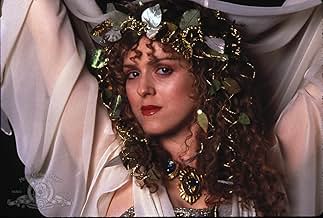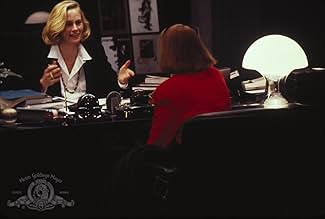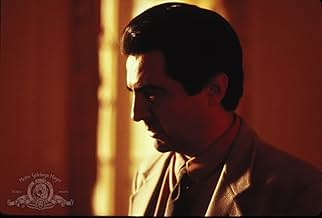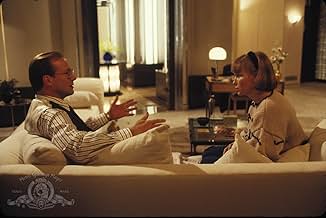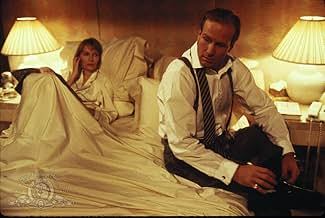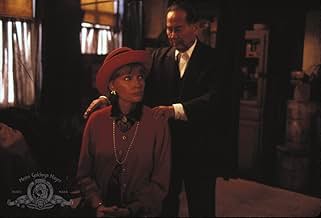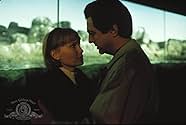IMDb-BEWERTUNG
6,6/10
15.909
IHRE BEWERTUNG
Eine verwöhnte Hausfrau aus Manhattan überdenkt ihr Leben, nachdem sie einen Heiler in Chinatown besucht hat.Eine verwöhnte Hausfrau aus Manhattan überdenkt ihr Leben, nachdem sie einen Heiler in Chinatown besucht hat.Eine verwöhnte Hausfrau aus Manhattan überdenkt ihr Leben, nachdem sie einen Heiler in Chinatown besucht hat.
- Für 1 Oscar nominiert
- 1 Gewinn & 7 Nominierungen insgesamt
Matthew H. Williamson
- Dennis
- (as Matt Williamson)
Empfohlene Bewertungen
This movie is Mia Farrow's most magical moment. She glows in this film and as Woody Allen doesn't appear in it, and the film is not a heavy drama like Interiors or Another Woman, it will appeal to most audiences. The plot dabbles in mysticism and magic, similar to A Midsummer Night's Sex Comedy and his segment in New York Stories, and is basically the story of a pampered woman in search of her identity. As Farrow's Alice is onscreen nearly every moment, the film couldn't have a better title. Alice begins to question her religious faith amidst an upper-class Manhattan setting and intellectual friends--in other words, she plays a female, Catholic version of the character Woody Allen has played in many other movies. There are not a lot of laughs in the movie but it still remains a classy winner, and a good start to Allen's '90s career. The big name cast (with the exception of William Hurt and Joe Mantegna) contribute cameo appearances, more or less; a casting move he would continue later in the decade. Not a movie that lends itself to countless viewings, like Manhattan or The Purple Rose of Cairo, but a definite charmer.
Next to the Front, this contains Woody Allen's best ending. There's one striking visual image in the plot I still can't get out my head: Mia is cheating on William Hurt with Joseph Mantegna and the 2 of them are over at Mantegna's apartment, while a glorious downpour crashes against a huge glass window behind them. The sound of the rain hitting the window compliments their nervous dialogue perfectly. One of Farrow's nicest performances (the Purple Rose of Cairo is her most heartbreaking). And where else are you going to see invisibility in the same story as Mother Theresa? One of Allen's better cast jobs, too. Even the smallest roles are exquisite. Gwen Vernon as Farrow's old time movie star mother is sublime. And Bernadette Peters makes a great wise cracking muse.
Alice Tate (Mia Farrow) is living in New York City, married to Doug (William Hurt), a man from a wealthy family. They have two kids, a lavish condo and domestic employees. Alice eats caviar, spends her days shopping, getting manicures and pedicures, and so on. However, she's not very happy. She's even been thinking about having an affair. When she finally goes to see an acupuncturist, Dr. Yang (Keye Luke), on several friends' advice because her back is bothering her, he tells her that her problem is in her head, not her back. Through his extremely unorthodox treatments, Alice gradually transforms her life.
Although there is a fair amount of light humor in Alice, and it is relatively upbeat and hopeful, the bulk of this film is much more in the vein of director/writer Woody Allen's more "serious" straightforward dramas, ala Interiors (1978), September (1987) and Another Woman (1988). Interestingly, Allen has a strong fantastical thread running through Alice at the same time, and it references a number of literary classics--both thematically and occasionally in terms of more literal content-resulting in a kinship also with Allen's A Midsummer Night's Sex Comedy (1982).
At its heart, Alice is a film about awakening and then achieving authenticity. It is told with a nod to Charles Dickens' A Christmas Carol (1843) (which is even supported by the appearance of "O Tannenbaum/We Wish You A Merry Christmas" by Liberace on the soundtrack at one point), with slight references also to Lewis Carroll's Alice's Adventures in Wonderland (1865) and other fantasy literature, including J.M. Barrie's Peter Pan (1911).
The catalyst through all of Alice's revelations is Dr. Yang, whose slightly rundown Chinatown office is symbolic of Alice periodically making trips to another world for enlightenment, or making repeated treks to pose questions to a metaphorical Oracle at Delphi. Dr. Yang's treatments are designed to address the various ways in which Alice needs to "open up", the various emotional needs she must come to terms with.
It is interesting to note, especially after Allen's The Curse of the Jade Scorpion (2001), that the initial spark for Alice's transformation is provided by hypnotism, as that device appears for the same ultimate purpose in Curse. This probably has some significance for Allen outside of his life in film, although it is difficult to say whether its because he's undergone hypnotic treatment himself or whether he just sees it as a metaphor for digging beneath public facades which one has fooled oneself into believing, too.
Dr. Yang's treatments either result in encountering some important person or event from Alice's past and/or tapping into some unrealized potential. The encounters are often not with real persons. They can be memories made almost literal, ghosts, or hallucinations. These are the most direct parallel to A Christmas Carol. As in that story, eventually Dr. Yang's treatments lead Alice away from an embrace of materialism for its own sake to an appreciation of more humanist values. Of course, Allen makes it a bit more complex than this, so that the positive transformation also has an impact on personal relationships that could be seen as negative, as well.
Alice is also remarkable for its cinematography, which is usually symbolic of the dramatic scenarios. Sometimes this is very overt, as when Dr. Yang's office transforms into an amusement park midway (the slowly strobing red light was particularly exquisite, with red also symbolizing caution), and often it is subtler, as with the tracking shots of Alice and Vicki (Judy Davis) seen through various glass-like surfaces, or Alice and Joe (Joe Mantegna) through a fence as prison bars, or Alice and Dr. Yang with a wall in between them as the camera pans from one to the other, and so on.
Of course the performances are good--Allen can even get admirable performances out of actors whom I usually do not care for, such as William Hurt. Of course most of the dialogue can easily be imagined as emerging from Allen's mouth instead of whatever character happens to be on screen. And of course the music selection is a fine collection of mostly pre-bop classic jazz. In other words, this is a typical post-Annie Hall (1977) Allen film, so if you like his style, Alice is a safe bet, and if you already know you dislike his style, you're probably not even reading this far.
Although there is a fair amount of light humor in Alice, and it is relatively upbeat and hopeful, the bulk of this film is much more in the vein of director/writer Woody Allen's more "serious" straightforward dramas, ala Interiors (1978), September (1987) and Another Woman (1988). Interestingly, Allen has a strong fantastical thread running through Alice at the same time, and it references a number of literary classics--both thematically and occasionally in terms of more literal content-resulting in a kinship also with Allen's A Midsummer Night's Sex Comedy (1982).
At its heart, Alice is a film about awakening and then achieving authenticity. It is told with a nod to Charles Dickens' A Christmas Carol (1843) (which is even supported by the appearance of "O Tannenbaum/We Wish You A Merry Christmas" by Liberace on the soundtrack at one point), with slight references also to Lewis Carroll's Alice's Adventures in Wonderland (1865) and other fantasy literature, including J.M. Barrie's Peter Pan (1911).
The catalyst through all of Alice's revelations is Dr. Yang, whose slightly rundown Chinatown office is symbolic of Alice periodically making trips to another world for enlightenment, or making repeated treks to pose questions to a metaphorical Oracle at Delphi. Dr. Yang's treatments are designed to address the various ways in which Alice needs to "open up", the various emotional needs she must come to terms with.
It is interesting to note, especially after Allen's The Curse of the Jade Scorpion (2001), that the initial spark for Alice's transformation is provided by hypnotism, as that device appears for the same ultimate purpose in Curse. This probably has some significance for Allen outside of his life in film, although it is difficult to say whether its because he's undergone hypnotic treatment himself or whether he just sees it as a metaphor for digging beneath public facades which one has fooled oneself into believing, too.
Dr. Yang's treatments either result in encountering some important person or event from Alice's past and/or tapping into some unrealized potential. The encounters are often not with real persons. They can be memories made almost literal, ghosts, or hallucinations. These are the most direct parallel to A Christmas Carol. As in that story, eventually Dr. Yang's treatments lead Alice away from an embrace of materialism for its own sake to an appreciation of more humanist values. Of course, Allen makes it a bit more complex than this, so that the positive transformation also has an impact on personal relationships that could be seen as negative, as well.
Alice is also remarkable for its cinematography, which is usually symbolic of the dramatic scenarios. Sometimes this is very overt, as when Dr. Yang's office transforms into an amusement park midway (the slowly strobing red light was particularly exquisite, with red also symbolizing caution), and often it is subtler, as with the tracking shots of Alice and Vicki (Judy Davis) seen through various glass-like surfaces, or Alice and Joe (Joe Mantegna) through a fence as prison bars, or Alice and Dr. Yang with a wall in between them as the camera pans from one to the other, and so on.
Of course the performances are good--Allen can even get admirable performances out of actors whom I usually do not care for, such as William Hurt. Of course most of the dialogue can easily be imagined as emerging from Allen's mouth instead of whatever character happens to be on screen. And of course the music selection is a fine collection of mostly pre-bop classic jazz. In other words, this is a typical post-Annie Hall (1977) Allen film, so if you like his style, Alice is a safe bet, and if you already know you dislike his style, you're probably not even reading this far.
Mia Farrow excels in this unexpectedly charming fable. I think if people happened upon this movie not knowing it was a Woody Allen film, they would be more than pleased with it. Knowing it is Woody, maybe many fans hold it to a higher standard. True, it's not anywhere near being his funniest or greatest film. But I think it is a well-cast, well-shot, well-produced, and even well-written tale. Knowing it's history, I was not expecting to like it nearly as much as I did. But I did, and I look forward to seeing it again. Mia really is underrated as an actress, isn't she?
I think Woody Allen's 'Alice' is one of his most under-rated creations. This movie comes from his glory days before the scandal with his adopted daughter eclipsed his U.S. career.
Here is vintage Woody. A fecund imagination married to a masterful story-telling talent.
Like 'The Purple Rose of Cairo' (his masterpiece in my estimation) this is pure fantasy and it is delightful. Mia Farrow has done nothing finer, equal to her portrayal in Polanski's 'Rosemary's Baby' though of a completely different genre.
The little socio-political messages do not interfere with what is otherwise a nifty little love story between Alice and Joe Mantagna. Things don't quite work out in the end, as is usual in a Woody movie, but they are on the border of real-life possibility and add the bittersweet note that he is so good at.
I love this movie. It is not one of his rocking comedies like 'Broadway Danny Rose' but is a sweet vignette. It has overtones of 'Diary of Mad Housewife' but with a happier ending, for the housewife anyway.
The scenes with Keye Luke, Alice's magical Eastern physician are subtle and funny. The fantasy scenes with Alec Baldwin's dead lover and the wonderful Bernadette Peters' muse are enchanting. Peters' Bronx-like muse is especially funny.
Don't miss it.
Here is vintage Woody. A fecund imagination married to a masterful story-telling talent.
Like 'The Purple Rose of Cairo' (his masterpiece in my estimation) this is pure fantasy and it is delightful. Mia Farrow has done nothing finer, equal to her portrayal in Polanski's 'Rosemary's Baby' though of a completely different genre.
The little socio-political messages do not interfere with what is otherwise a nifty little love story between Alice and Joe Mantagna. Things don't quite work out in the end, as is usual in a Woody movie, but they are on the border of real-life possibility and add the bittersweet note that he is so good at.
I love this movie. It is not one of his rocking comedies like 'Broadway Danny Rose' but is a sweet vignette. It has overtones of 'Diary of Mad Housewife' but with a happier ending, for the housewife anyway.
The scenes with Keye Luke, Alice's magical Eastern physician are subtle and funny. The fantasy scenes with Alec Baldwin's dead lover and the wonderful Bernadette Peters' muse are enchanting. Peters' Bronx-like muse is especially funny.
Don't miss it.
Wusstest du schon
- WissenswertesSean Young filmed a small role, but it was later cut. She had been deleted from Woody Allen's previous film Verbrechen und andere Kleinigkeiten (1989) as well.
- PatzerWhen Thelonious Monk's version of "Darn That Dream" appears on the soundtrack, the LP sleeve of "Monk's Dream" is shown, implying that Alice and Joe are listening to it. However, the tune is not featured on that album.
However, implications are not necessarily fact; it might be that Alice and Joe had been listening to several Monk albums and had not been meticulous in returning the discs to the appropriate sleeves.
- SoundtracksLimehouse Blues
Written by Philip Braham & Douglas Furber
Performed by Jackie Gleason
Courtesy of Capitol Records, Inc.
By arrangement with CEMA Special Markets
Top-Auswahl
Melde dich zum Bewerten an und greife auf die Watchlist für personalisierte Empfehlungen zu.
Details
Box Office
- Budget
- 12.000.000 $ (geschätzt)
- Bruttoertrag in den USA und Kanada
- 7.331.647 $
- Eröffnungswochenende in den USA und in Kanada
- 36.274 $
- 25. Dez. 1990
- Weltweiter Bruttoertrag
- 7.331.647 $
- Laufzeit
- 1 Std. 46 Min.(106 min)
- Farbe
- Seitenverhältnis
- 1.85 : 1
Zu dieser Seite beitragen
Bearbeitung vorschlagen oder fehlenden Inhalt hinzufügen


